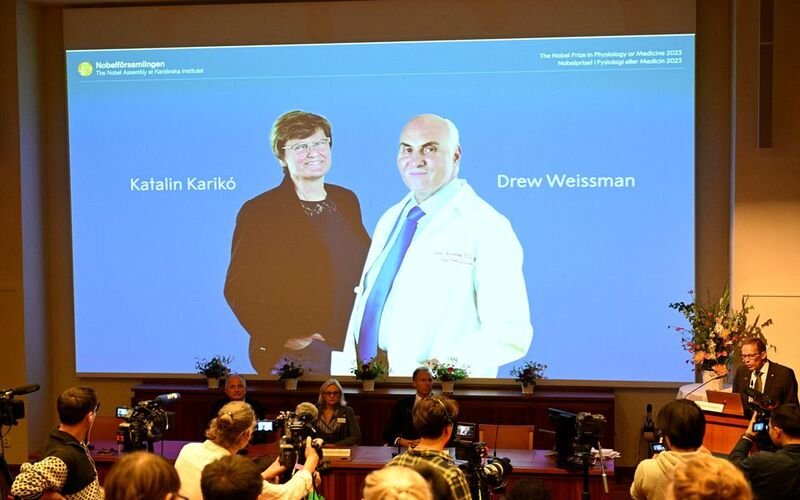The 2023 Nobel Prize in Physiology or Medicine was awarded to scientists Katalin Kariko and Drew Weissman from Hungary and the United States, respectively, for their work in allowing the creation of mRNA COVID-19 vaccines. The Karolinska Institute Medical University in Sweden’s Nobel Assembly selects the award, which is among the most prominent in the scientific community and carries a cash reward of 11 million Swedish crowns ($1 million).
“The 2023 NobelPrize in Physiology or Medicine has been awarded to Katalin Karikó and Drew Weissman for their discoveries concerning nucleoside base modifications that enabled the development of effective mRNA vaccines against COVID-19,” the organization stated.
Before 2022, Kariko served as senior vice president and director of RNA protein replacement at BioNTech. Since then, she has served as an advisor to the business. She also teaches at the Perelman School of Medicine at the University of Pennsylvania and the University of Szeged in Hungary. Professor of vaccine research at the Perelman School, Weissman.
Kariko has discovered a mechanism to stop the immune system from mounting an inflammatory response against laboratory-produced mRNA, which was previously thought to be a significant barrier to any therapeutic use of mRNA.
She and Weissman demonstrated in 2005 that modifications to nucleosides, the molecular letters that form the genetic coding of the mRNA, can prevent the mRNA from being detected by the immune system.
“So this year’s Nobel Prize recognizes their basic science discovery that fundamentally changed our understanding of how mRNA interacts with the immune system and had a major impact on society during the recent pandemic,” said Rickard Sandberg, a member of the Nobel Assembly from Karolinska Institute.
The first of this year’s honors, the medical prize, will be announced soon, followed by the other five. The Nobel Prizes were established in 1901 by Swedish dynamite inventor and affluent businessman Alfred Nobel. They are given out for accomplishments in science, literature, and peace, with economics included in the following years.
On December 10, the anniversary of Nobel’s passing, the Swedish king will bestow the awards in a ceremony in Stockholm that will follow a spectacular supper at city hall.
The Nobel Prize in Medicine was given to the Swede Svante Paabo last year for mapping the DNA of the extinct Neanderthal, a relative of modern humans, and for uncovering a previously undiscovered human ancestor, the Denisovans.
Previous winners include Karl Landsteiner in 1930 for discovering human blood types and Alexander Fleming, who shared the 1945 award for discovering penicillin.













































Comment Template